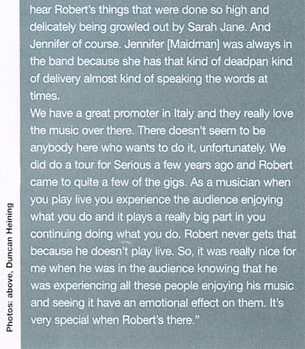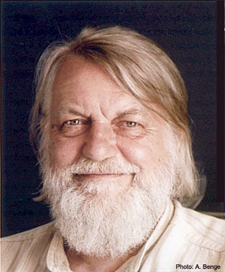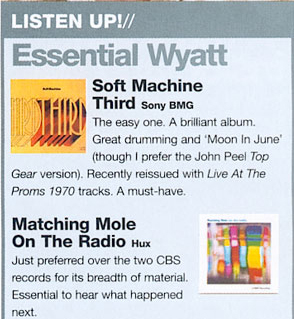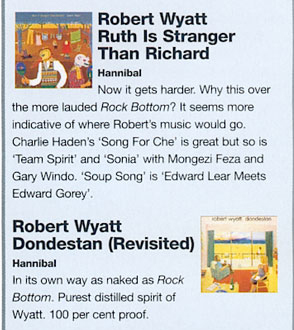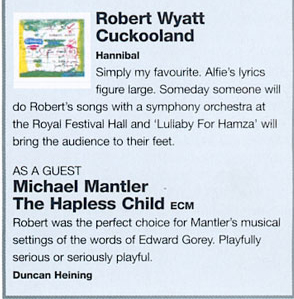| |
|
|
 Human
Nature - Jazzwise - Issue 113 - October 2007 Human
Nature - Jazzwise - Issue 113 - October 2007
|

|
H
ow do you describe Robert Wyatt?
Musician? Clearly. Song-writer?
That goes without saying. Activist? Fair enough. But beyond
stating the obvious, it gets increasingly difficult to
define what he does. As if bemused by their own appeal,
his songs defy easy categorisation and yet their charms
communicate across generations and genres. Robert has
just signed with Domino, the hippest of young independent
labels and home of the Arctic Monkeys, Franz Ferdinand
and more oddball talents like Stephen Malkmus and Jim
O’Rourke. Oh, and he’s about to release his
latest album, Comicopera.
Louth in Lincolnshire, where Robert and partner Alfie
Benge live, is about 200 miles and three decades from
London. Piles of books, records and musical instruments
clutter their rambling Georgian house close to the town’s
centre. Photos, political posters and Alfie’s art
on the walls. In the hall two carrier bags full of paperbacks,
unclear whether they are coming in or going out. Two lives
lived to the full. Outside in Louth itself, Robert and
Alfie seem well-known to the town’s other residents.
In the local hippy shop, all patchouli
oil, josticks and Indian prints, Robert chats with the
owner, pointing me out to her, “This is Duncan, he’s
up from London to do an interview. I just thought I’d
show him your lovely shop.” And in the record shop,
Off The Beaten Tracks, they quickly work out what I’m
doing here, “Yeah, Robert comes in quite a lot, mostly
to order CD’s he’s seen reviewed in Jazzwise."
|

|
The sun is warm over Louth today
and we chat over a sausage bun outside Stan’s on the
market. Robert had been at Ryko for years but a recent take-over
led to sackings of trusted friends, people like Andy Childs
whom they’d known since Robert had been on Rough Trade
records.
If they really cared about the music they’d be pleased
they’d got somebody like Andy. It just didn’t
feel right. So, we left and they were a bit surprised and
a bit cross. But Alfie cleverly got it built into our contract
that we weren’t collateral for deals like that.”
Alfie took on the task of sorting out Robert’s business
affairs some years ago. “This wasn’t by choice,”
she tells me. “This is by seeing how chaotic some things
are and how Robert signs things that are not in his best
interests. Like signing songs to a publisher, who’s
totally hopeless, for eternity instead of checking him out
first."
I turn to Robert, who has a Stan Laurel-like
look on his face: “You should have been a jazz musician,
Robert”. He laughs, “I’ve got the makings,
haven’t I? ‘Jazzwise’ being a contradiction
in terms.” “Yeah, technically and brain-wise,”
Alfie chips in. “I come from a long line of jazz musicians.
Also, there’s been quite a lot of crooks involved in
Robert’s life. It seemed sensible to keep it in the
family but it’s not my chosen metier. I find it really
irritating.”
Back at the house, I ask Robert if he minds if I take a
couple of photos. “No, not at all,” he says, “though
I am having a bit of a bad hair life.” I explain that
I’m using two tape machines for the interview, as in
the past machines have stopped working without my realising.
It turns out such things have happened with Wyatt interviews
before.
“The thing that’s confusing for people, if they’ve
had to do it again, is that for every question I have a
completely different answer. So, it’s very hard for
them to sync up an interview. Like, ‘How are the 60s?’
‘Great!’ ‘How are the 60s?’ ‘Crap!’
‘Are you happy?’ ‘Yeah!’ ‘Are you
happy?’ ‘Am I fuck!’ So, that was just a
warning.”
|

|
Robert’s politics, however, remain
more consistent. Like his albums they’re intensely
personal and derive from a strong moral sense. Anti-racist,
due to his love of jazz and black music. Anti-imperialist
and socialist, due both to his parents’ example and
to his own anti-racism. These values are steadfast and infuse
Robert’s songs, not in any crude agit-prop way, but
because they arise naturally from the processes of contemplation
and reflection. Is he glad to see the back of Blair? Obviously.
But does he have any sense that Brown may be any better?
"Actually, I'm grateful that, by association, two of
the most unpleasant Western prime ministers had to go. Tony
Blair dragged them down with him. The whole of Europe breathed
a sigh of relief at getting rid of fucking Berlusconi and
the equally odious Aznar. So, thank you Tony for that. I
don't like doing reverse personality cults. I agree with
Tony Benn about that. But on an emotional level I feel slightly
less ashamed having a grown-up going around talking on behalf
of the British people as opposed to a prep school tosser.
But that's a personal opinion rather than a deeply political
analysis."
Sometimes, it's only the laughing that keeps you from crying,
isn't it? But somehow Robert, and Alfie, stay optimistic.
Of course, the joy, energy and camaraderie that goes into
the creation of a work like Comicopera must surely
help. And the making of a Robert Wyatt album is a painstaking
process. Much of it takes place at home. Though he's used
other people to produce his records in the past, notably
Nick Mason on Rock Bottom and Clive Langer on Shipbuilding,
Robert is essentially his own producer these days. Advice,
however, from Alfie, engineer Jamie Johnson and friends
like Brian Eno and Phil Manzanera also feed in.
"Jamie Johnson is such an intelligent engineer that
we can work as a team when I'm putting stuff together. Then
I get a lot of vocal advice, and 'vocal' advice, from Alfie.
Basically, consisting of, 'You could do that again, only
better.' [chuckles] Actually, Alfie has ideas, like, 'why
don't you try this?' or 'why don't you come in on that set
of notes?' Nick Mason was great because he wasn't a professional
producer. I asked him, partly in gratitude to the Floyd
because they were so nice to us and because I thought that
if anyone knows about sitting in a studio and getting a
good sound out, it's got to be one of this lot and that
turned out to be the case."
Actually, when Robert injured his back in 1973, the Floyd
jumped in and did a couple of benefits at the Rainbow for
him raising over ten grand to help out. They're still friends
and it was in part a suggestion from David Gilmour, that
encouraged greater emphasis on Robert's voice in the mix
on Comicopera.
"Alfie used to get worried that my voice was getting
lost in my own production of it. Also Gilmour said that.
He said, 'People want to hear the voice.' Meaning he wanted
to hear the voice. I thought, 'OK. You can hear it now'.
But I also like it as just something else in there."
|

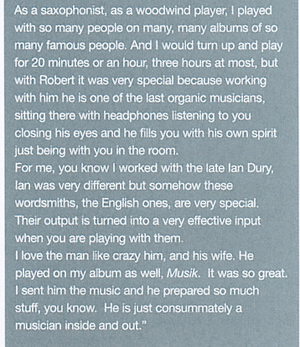
|
I suspect that the attraction of
Robert's music, for artists as different as David Gilmour,
Brian Eno, Elvis Costello, Paul Weller and Björk,
comes from the fact that there is no separation between
the art and the man. It is that which gives it integrity,
in both senses. As ever, songs off the new album, like the
beautiful 'Out Of The Blue', don't grab the attention even
where their Iyrics are at their most pointed. They sail
into view and touch you even before you're fully aware and
they still have that emergent, improvised quality of his
best work. That, I'm sure, derives from his love of jazz
and is why he chooses such strong players to interact with
on his records. Trombonist, Annie Whitehead is there again,
as are Gilad Atzmon and bassist Yaron Stavi as well as Orphy
Robinson. All three have become crucial to Robert in his
music.
He's known Annie since the 70s, having met through shared
friendships with musicians like Mongezi Feza, Dudu Pukwana
and Keith Tippett. "We actually recorded together the
first time on a record Jerry Dammers put together - Wind
of Change, on behalf of the Namibia liberation movement,
SWAPO. I particularly liked the way she was listening to
what everybody else was doing. She's just utterly lovable,
very, very quick and got an awful Lot of soul."
Annie has also put together a group to play Robert's music,
Soupsongs, which has played gigs in the UK and continues
to perform in Europe. As for Gilad, Robert describes himself
as a "sort of Gilad groupie" and he asked the
saxophonist very hesitantly if he'd play on Cuckooland,
his last album for Ryko. "He had no idea who I was
or what I had done or anything like that. I realised he
just loves to play. Whatever I'd asked him to do, if it
involved playing, he'd have said, 'yes'. He was such a joy
to work with. He was just such an enthusiastic collaborator
and so fast at hearing what was required. Yaron Stavi and
Gilad, I regard as like Sancho Panza and Don Quixote and
I love them both. It's very hard to talk about people when
it goes beyond professional admiration to that sort of kind
of love and I have it for various people, Phil Manzanera
and Paul Weller being another two but that's really that."
Singer, Mônica Vasconcelos, is another artist who
appears on Comicopera and is heard to stunning effect on
'Out Of The Blue'. Robert has recently been working on the
singer's new album.
"She got Alfie involved because she wanted to do more
stuff in English and Alfie had a go at some words for tunes
Steve Lodder and Dudley Phillips had written for her. I
did a bit of singing on it and chipped in a few ideas. I
think I was invited. [Long pause) Oh, god, I hope so. I
think Dudley or Steve would...
Anyway that's the forthcoming Mônica Vasconcelos album
and I really like her voice. It's so true. And I use her
on a monicatron towards the end."
That's where Robert records somebody - Brian Eno, Karen
Mantler or, here, Monica - singing all the notes of the
scale. Then Jamie Johnson transfers it to computer and from
there to keyboard, "So I have a keyboard of that person's
voice and I can play chords of it. I love doing that. I
tried it on my own voice but it was rubbish. It was all
out of tune."
As far as singers go, Robert's own tastes are diverse. "I've
been listening to stuff that was very dependant on the idiosyncrasies
of the voice like Johnny Cash and Bob Dylan together. Like
this ultrasmart, ultra-educated Jewish intellectual from
the North and this pure moral, country boy musician and
I find their friendship really moving for some reason. It's
all in there with their record. I thought this is serious
here."
Joni Mitchell is also important to Robert, as is Peter Pears
(Benjamin Britten's partner), mainly because of specific
qualities in their voices. "There's also people in
jazz I like but I can't say they've influenced me. I find
Betty Carter gob-smacking and I like musicians who sing
sometimes in jazz. I like Dizzy Gillespie's 'Oo Bop Sh'
Bam' stuff or Jimmie Smith doing 'Got My Mojo Workin",
which is really kind of rough stuff."
I ask about Chet Baker. There's something in that wispy,
waif-like sound that has parallels with Robert's voice.
"Well, I suppose that's so built in. I mean Chet Baker's
biggest influence on me is the fact that I really like this
thing of a bit of vocal, a bit of trumpet and I think one
of the reasons I took up the trumpet again was because I
was so haunted by that thing of moving backwards and forwards
between those two.
Although I can't play trumpet like a musician, I'm able
to play it like a singer or at least like I sing."
And what about Billie Holiday?
"What I like most about her, it's a bit of a cliché,
but what not to sing. What actually goes naturally with
a voice and in her case if you've got good enough music
around you just let it come through and just ride it like
a yacht. And I really like her later stuff too. Jazz people
say her voice had gone to pieces by then but as far as I'm
concerned that's rock 'n' roll. What did they know? It's
like late period Johnny Cash, it's got 50 much soul."
Robert never set out to be a singer, a fact that still guides
his approach, as he tells me chuckling to himself. "I've
got this completely negative approach to singing - try not
to make too many mistakes, try to hit the right note, be
grateful for that and move discreetly on to the next one."
Early Soft Machine bootlegs, in fact, suggest that Robert
had a pretty fine white soul voice.
"I really got into that classic
English beat group thing which was taking black American
records from Sue and Motown and replacing the backing they
had with a more skiffle-based thing. That's what the English
Beat Group scene really was, Black Music played by skiffle
groups. And I was absolutely part of that and with the Wilde
Flowers live gigs, that's what it was."
At the same time, however, Robert's father and mother were
both great music lovers. The majorily of records they had
were classical, though quite a few of those featured 20th
century composers like Stravinsky, Ravel and Debussy who
were inspired by jazz. It was a remark made by his father,
that prompted Robert to start listening to jazz.
"My dad mentioned he really liked Duke Ellington and
Fats Waller because he'd seen this seminally important film
Stormy Weather, that celebrated black culture albeit in
that sort of ersatz way. So, I got Duke's Such Sweet
Thunder when I was 11 or 12, which he sort of approved
of because it was a Shakespearean Suite, and I was off.
I was just completely, as they say, blown away."
The other thing that Robert mentions as being important
was his parents collections of art books. "I never
thought I'd be a musician. I didn't want to be anything
really. I just wanted a girlfriend really. I thought I might
want to be a painter because that's the other thing we had
a lot off. These books of reproductions of paintings, I
was very influenced by those." It's there perhaps in
the painterly attention Robert brings to his work but also
in the collage-like impression his songs leave. It's entirely
fitting that Alfie, herself an ex-student of art and film,
brings those same skills to the covers and typography of
a Wyatt record. "We are absolutely a team, me and Alfie.
She has all these skills she acquired from art school and
because she gets involved sometimes with the music and the
lyrics and we do so much together, she's naturally part
of everything I do. She's the one who really took control
of how things are done, like cover art and presentation
and typography.
Ever since Rock Bottom, she's been in charge of that. She's
particularly conscious that now people can download, the
whole thing should be worth having as an object.
The drums were obviously an early enthusiasm and Robert's
first drum kit consisted of the usual mix of household objects,
which he'd use to play along with Max Roach "Bit ambitious
that'. His first proper kit, the cheapest Premier set he
could buy, lasted him through his early professional career.
He had lessons with a visiting American drummer and summers
were spent on Mallorca living near Robert Graves, a friend
of both Robert's parents. Graves' son-in-law owned the Indigo
Jazz Club and Robert got to practise and even jam at the
club. His first group with Kevin Ayers, Hugh and Brian Hopper
and Richard Sinclair was The Wilde Flowers and when that
disintegrated, Robert formed Soft Machine with Ayers and
Mike Ratledge. Sharing the same management as the Jimi Hendrix
Experience, the group toured the States with Hendrix. The
downside of that was that Robert began to develop a big
liking for alcohol and it was whilst under the influence
that Robert fell from a window in June 1973 and ended up
paralysed from the waist down. The upside, however, was
that he learned a great deal personally and musically from
playing America, not least from Hendrix's drummer, the sadly
underrated Mitch Mitchell.
"Going from Beat group gigs to bigger gigs, Mitch really
taught me a lot about how to handle that musically. In fact,
he gave me his kit when the tour ended because he said,
'Robert, I can't bear the thought of you playing on that
crap kit you've been playing'." Robert laughs his body
quivering at the memory. He still has the kit. Both he and
Mitchell shared an enthusiasm for jazz drummers, Elvin Jones
and Tony Williams. "Me and Mitch used to listen to
a particular track by Miles Davis with Tony on it, 'Stuff',
but I've liked Tony Williams ever since he was with Jackie
McLean. Elvin, we loved because the momentum and the weight
of what he did was very useful information because of the
volume at which rock groups played. He actually matched
that sort of depth and volume of rock."
Inevitably, the shock of hearing Hendrix for the first time
has stayed with Robert. "I still remember first hearing
Hendrix get into gear in rehearsal. You just thought, 'What
the fuck is that?' This sensaround thing of controlled feedback.
There were people like Jeff Beck and to a certain extent
Pete Townshend who were controlling feedback but this sustained
landscape at a certain volume and absolutely controlling.
It was blinding. It was like a great living, breathing river
of sound."
There was opposition in some quarters to the Softs doing
the tour but Hendrix supported them. "Some people thought,
'Soft Machine? They're not very poppy. He's playing stadiums.
He's got hit records.' But I'm very grateful to Hendrix
because he stuck up for us, and the band did, and Hendrix
didn't like pop groups that much. He wanted people who were
trying something different and didn't want people copying
him. And, of course, we weren't. We were trying to do something
else. He was very respectful about what we were trying to
do and (laughing) very polite about our ability to do it.
Real gent."
Though he's put in the occasional guest stage appearance
with friends from Annie Whitehead to David Gilmour, Robert
stopped doing gigs not long alter his accident. People would
love to see him live, as he knows. "I feel a bit sheepish
about it because normally the gigs are the promotion for
the LP. The difficulty with gigs is that I don't really
think like that. So much of what I do now depends on a kind
of Beach Boys-isation of the voice, of double octaves and
so on. It's all in the editing. I tried to do a sort of
imitation of a live gig with Annie's band. A couple of songs
came out all right. But I wasn't really comfortable and
some of them were so not right and there was nothing I could
do about it. I just don't have that kind of confidence to
do it live in front of a band. I did drumming and drunk
but voice and sober, it's just not going to happen. I don't
have that chutzpah."
Maybe Domino and Robert's many friends might someday persuade
him. It would be wonderful to see him do a short residency
at somewhere like Ronnie's. Somewhere he'd be appreciated
but also somewhere intimate, where the warmth of the man
could come across. Till then, there's Comicopera
and Robert's back catalogue to keep us happy. |









